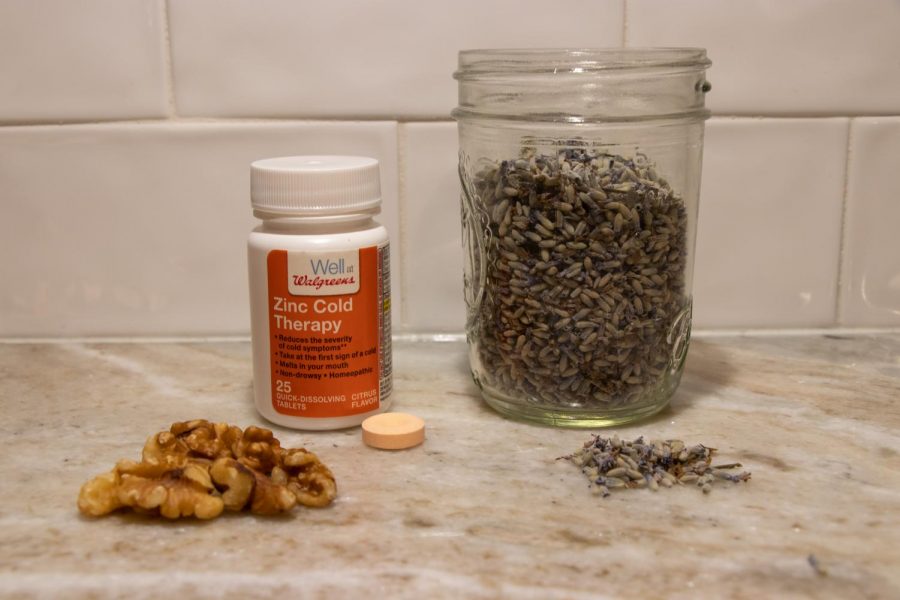Three Supplements Actually Backed by Science
Zinc, lavender and the omega-3 in walnuts are just a few supplements that have scientifically proven benefits.
April 7, 2020
Supplements and herbs are all part of complementary medicine, which are therapies that fall beyond the scope of evidence-based medicine. Nevertheless, medical researchers do study some therapies and supplements that fall under this umbrella. Not all the supplements produce the intended results when studied against a placebo, but some, like the three following herbs and supplements, have actually produced promising results.
When taking any supplement, it’s important to both do your research and consult your doctor. Supplements are not regulated by the Food and Drug Administration: Both the safety and labeling of supplements are up to the manufacturer. Many factors, including harvesting and processing methods, also affect how potent the supplements are.
Though they may seem like natural or harmless complements to conventional medicine, supplements of any kind can have harmful interactions with drugs one might already be taking. Others may cause health risks that may outweigh the purported benefits of using the supplements. That’s why one should always consult their doctor before starting any kind of supplement.
Zinc
Your immune system, among other bodily mechanisms, already requires zinc for optimal functioning. Immune cells sometimes increase their interior concentration of zinc; the high levels of zinc make for a harsh environment for an engulfed pathogen, which hastens their demise.
There are several small studies that may indicate zinc’s effectiveness in shortening the common cold. However, in order to see effective results, one needed to take zinc at the onset of symptoms. Moreover, there are side effects associated with zinc intake, which include nausea and a persisting bad taste. Based on the data, researchers didn’t recommend taking zinc every day to prevent the onset of colds.
According to the Mayo Clinic, taking zinc in lozenge or syrup form is the best way to see this effect. This way, the zinc has a better chance of coming in contact with the virus that causes the common cold in the throat. It’s also important to avoid taking zinc in large amounts because large amounts of zinc can cause anemia, suboptimal immune functioning and copper deficiency.
Lavender
Derived from the flowers at the top of the plant with the same name, lavender may reduce anxiety and promote sleep, according to Memorial Sloan Kettering Cancer Center (MSKCC). Individuals can take lavender in a supplement or apply it topically on the skin. Many studies have also analyzed lavender through aromatherapy.
One study of patients with anxiety-related restlessness found that lavender, when taken orally, alleviated restlessness in slightly more individuals than a placebo. Another study of college students who reported sleep issues wore either a blank patch or one with aromatic lavender for five nights; the students who practiced better sleep habits and had the patch with lavender experienced better quality of sleep compared to those who had only practiced better sleep habits.
MSKCC doesn’t recommend taking lavender in addition to sedatives because lavender may increase the drug’s effects. Applying lavender directly to the skin may also cause irritation. It’s unclear how lavender improves sleep, but incorporating lavender in one’s sleep routine may improve sleep quality.
Omega-3
Lastly, omega-3 fatty acids are derived from fish oils. According to MSKCC, these fatty acids may help with heart health, cholesterol levels and depression. Fish are not the sole source for omega-3; linseed oil, flaxseed oil, walnuts and chia seeds are also a good source for omega-3.
Omega-3 does not lower the risk of having a heart attack, but for individuals with a history of strokes, a study has shown a reduction in subsequent strokes for those who supplement omega-3s in their diets.
Omega-3 has shown the most promise in regard to cholesterol levels. According to the Mayo Clinic, omega-3 may help lower one’s levels of harmful triglycerides, and research has also demonstrated a slight increase in HDL cholesterol, a molecule that reduces the risk for heart disease. A caveat, however, is that omega-3 has been shown to increase harmful LDL cholesterol.
On the whole, omega-3 may lower harmful inflammation. Omega-3 supplementation may also help protect the skin from sunburn and ultraviolet light.














